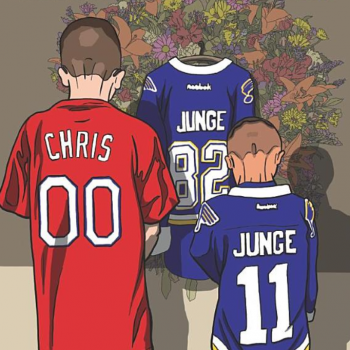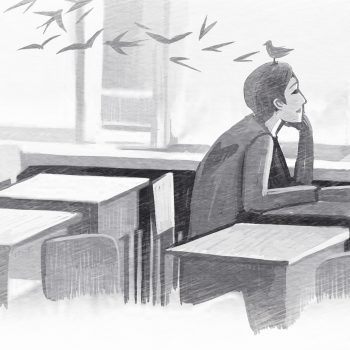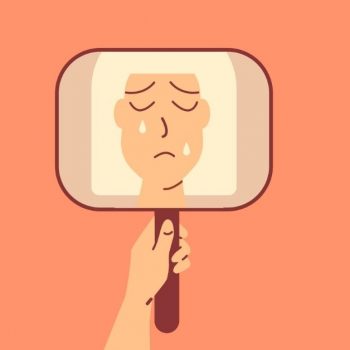Grieving the Life You Expected: Nonfinite Grief and Loss
/ Types of Grief and Loss : Litsa
For further articles on these topics:
From a very young age, we begin to develop expectations about the world around us. Our brains create rules to help us organize the boatloads of information we encounter each and every day. Some of these are simple, practical rules. For example, you might learn that a home is a place where you live that has a bedroom, bathroom, living room, and kitchen. But as your world gets more complex, you learn that there are different types of homes - houses, apartments, condos, etc. The term schema describes rules, which allow us to learn information and then accommodate new and more complex information.
The rules we create as shortcuts to understanding and organizing the world don't just apply to tangible objects. There are schemas (aka schemata) about people, roles, traits, and other aspects of our lives. We absorb subtle ideas about what values our family, culture, and society have collectively attributed to things, and these become connected to our schemas. They help us organize what we know to be safe and good and what we know to be bad or scary.
Our schemas help to create our beliefs about what an ideal life looks like, from small things to big things. Depending on where I grow up and the messages I absorb, my schema may include the value judgment that it is better to live in a house than an apartment. And though a condo and an apartment may look identical as physical structures, I may have absorbed the value judgment that it is better to own a condo than rent an apartment because I value property ownership. If you're still struggling with the concept, check out this video.
Wait, wasn't this article supposed to be about nonfinite grief?
I know, this sounds like it has nothing to do with grief. But bear with me. Schemas are critical to understanding nonfinite grief. Because the meaning and significance we ascribe to the things we want, expect, idealize, and fear in life begins early. Things can become meaningful to us long before we actually have (or lose) them, because of our expectations and ideals. When life is proceeding as we anticipated, we barely notice these schemas. If we don’t encounter anything that challenges or violates our schema, then we just go on living, tucking the things that happen neatly into our existing expectations.
Imagine I came from a childhood where my family and peers generally expected me to get good grades, go to college, settle into a stable career, meet a man, get married, and have children. That is what I saw in my friends and family members around me. If everything proceeds seamlessly along that path, those schemas are just running in the background, and we are barely aware of them. As I check things off the list, I file them away as part of my 'normal', good, or successful life. But what happens if my life veers from that course?
Nonfinite Grief and the Loss of Plans, Hopes, and Expectations
Let's imagine another situation - one where my life takes a different path. Perhaps I went to college, I met someone and I got married. My mind keeps seeking and expecting the other things too - a stable career, getting pregnant, and having children. If I can't find work in my chosen career or get pregnant, my life now diverges from my schema for a happy, successful, meaningful life.
And though I never had a stable career or a pregnancy and children, I did have those plans. I had that picture in my mind of the life I always imagined, aligned with my values and ideals. Nonfinite grief is the grief we feel when we lose these non-tangible things, watching our imagined future dissolve. In Nonfinite Loss and Grief, Bruce and Shultz define the grief that exists when life falls short of our expectations. They say that nonfinite losses are losses "contingent development; the passage of time; and on a lack of synchrony with hopes, wishes, ideals, and expectations".
Nonfinite Grief Creates Fear
Usually, a negative life event or episode leads to a loss, but the loss has an ongoing presence in the person's life. There is an ongoing dissonance between the expected life and the life being lived.
Often, one step beyond the uncertainty and the dissonance is fear and dread. Of course, there is always a fear of the unknown and the chronic uncertainty that comes with nonfinite loss. But sometimes it is more than that - the life that is now unfolding is one that my schema tells me is something to be dreaded, feared, or avoided.
When I realize my career and plans for a family won't be what I always imagined, there is a deep loss that I must acknowledge and grieve. There is also potential uncertainty about what my future will hold. But if my schema understands a life without children as something objectively dreadful and terrifying, this creates even more fear. Let's be clear, here. If I've always wanted children and that doesn't happen, there will be overwhelming grief regardless. But that fear can make adapting even more difficult.
If, instead, my schema accommodates that there are many types of meaningful families, some with children, and some without children, my pain will still be immense. I will still have the devastating grief of losing the life I wanted and imagined. But I will not have the added barrier of believing the alternative is something fearful. I won't assume that a meaningful life is impossible for anyone without children.
Nonfinite Grief is Ongoing and Separates One from the Mainstream or 'Ideal Life'
One of the challenges of nonfinite losses is that they are ongoing. One specific event often creates the loss, but the impact of the loss continues across time. For instance, if I experience a devastating injury that leaves me paralyzed, this is a single event. But this isn't simply a single event to be grieved. Each aspect of my life impacted by the injury, in the present and the future, extends the loss.
Nonfinite losses often, though not always, create a life where people feel their experience is now "other". Rather than viewing their new life trajectory as an alternative path, we see it as less-than, abnormal, or outside the bounds of a mainstream experience (Schultz & Harris, 2011). This not only creates a distance between the self and others, but it also reinforces the feeling of the lifepath that is vs the lifepath that should be.
Grieving The Ideal Life
Many of the examples of nonfinite grief that we've shared thus far involve an event that derails a trajectory. Imagine I am a professional hockey player, in my first year in the NHL. I expect and imagine a long future as a player when an injury ends my career. It is easy to understand why I might find myself grieving what 'could have been' or 'what should have been' because I reasonably expected that life.
But what if my mother left me when I was just a baby? I never met her, nor did I ever have any expectation that she would be in my life or my future. Though this type of nonfinite grief will have plenty of differences from that when our trajectory is actively derailed, this is still its own loss. The idea of a mother-child relationship is part of most people's schema of the ideal life, the life that one should have. Even if we never knew a life on that path, we can still feel a deep sense of loss that we didn't have the ideal life we 'should' have had based on our schema.
I'm Experiencing Nonfinite Grief. What Do I Do?
There is no single solution and working with a therapist can be a big help. But on your own, you may find some of the following helpful.
- Acknowledge the loss. Often these losses are not fully recognized by others. It is important to remind yourself that these are real and valid losses, even if they are not death-related losses. If you find yourself comparing losses, immediately shutting down your emotions by saying "it could be worse, I should just be grateful", give yourself space for your feelings. Yes, it could be worse. And yes, you are also still experiencing something devastating that you are allowed to acknowledge and feel.
- Practice dialectical thinking. As humans, we can be very black-and-white thinkers. We categorize things as good or bad, or right or wrong, when often things exist in shades of gray. Two things that feel contradictory to one another can both be true. It can be helpful to practice holding two truths at the same time, being open to the idea that there are many lives worth living. Even though you may not be living the life you always imagined and hoped for, that doesn't mean it can't have joy and meaning. Read more about dialectical thinking here.
- Control the flow (or flood) of information. Imagine that your child suddenly receives a diagnosis of a chronic illness that will undoubtedly change the direction of the rest of their and your lives. What do you do next? If you answered "take to google and spend every waking hour in an internet black hole reading every medical journal article, personal blog, and reddit thread you can get your hands on" you're perfectly normal. In the face of fear and uncertainty, we desperately seek information. Unfortunately, this quest for answers is not only overwhelming to your system in every way, but it often presents you repeatedly with information and stories that violate your concept of yourself and your child and your imagined future. Though this can feel impossibly difficult, try to ease yourself in to this new reality. Take in information in small dose, with time and support.
- Explore your personal ideals and fears. Go back into your own history and consider messages you received about yourself, how life 'should' look, and what events should be feared. Try to be honest with yourself about these ways of understanding the world and where they came from.
- Examine, reexamine, challenge, and reality test your fears and dread. I want to be clear, this isn't trying to think your way out of a devastating loss. But it is acknowledging that sometimes those internalized beliefs we have are exacerbating our feelings of pain and dread is important. If you've never known someone with a severe physical disability that you now have, expose yourself to people living with physical disabilities. Now that you've understood or decided you won't have children, if your friends and family all have children it can help to begin expanding your circle to meet other childless individuals. Meeting both those who are childless by choice, and those who wanted children but didn't have them can help you re-examine and challenge your assumptions about a life without children. If you've always feared those with addictions and have not known anyone with an addiction, examine your fears by humanizing addiction. Expose yourself to people who have struggled with substance use or other addictions. Begin with those in recovery and expand to those still battling active addictions.
- Reconstruct your identity. With any nonfinite losses, your self-concept is deeply impacted. Who you understood yourself to be in the world or imagined you would be in the world can feel like it no longer aligns with who you are. Spend time connecting with the core pieces of yourself that remain intact. Acknowledge the roles and identities you have lost (or will never have) and those that you have taken on. Consider who you were, who you are, and who you hope to be.
- Practice tolerating uncertainty. Easier said than done, I know. But life after loss - no matter what the loss - almost always involves some uncertainty. The degree to which we can tolerate that uncertainty correlates to our overall sense of well-being. Learn some skills for tolerating uncertainty and ambiguity.
- Consider the idea of 'adaptation' rather than 'acceptance'. "I will never, ever accept this" is a common refrain from grievers. And we get it. Acceptance is a complicated word, to put it mildly. The idea that one needs to feel acceptance sounds like we're being asked to consent to this new, dreaded reality. Rather than focusing on acceptance, it can be helpful to focus on adaptation. Bruce and Schultz explain that there may always be moments of rejecting the new reality. People will almost always have fleeting moments of wishing for the life that 'should' have been. This can be true years or decades down the road. But we can continue to find the loss 'unacceptable', while still trying to actively adapt to our new reality with an openness to hope.
- Redefine hope. Like reconstructing identity, redefining hope is a critical component of many non-death losses. Though our inclination can be to fixate on changing the circumstances of the loss and maintaining hope that things will get back on track or go back to "normal", this is often impossible. It simply reinforces a sense of helplessness. By facing the present moment, you can ask yourself what hope looks like in this new reality. You may need to find many new ways of understanding and measuring hope based on the current reality. How you define hope will continue to change as you and your life continue to change.

We invite you to share your experiences, questions, and resource suggestions with the WYG community in the discussion section below.
We wrote a book!
After writing online articles for What’s Your Grief
for over a decade, we finally wrote a tangible,
real-life book!
What’s Your Grief? Lists to Help you Through Any Loss is for people experiencing any type of loss. This book discusses some of the most common grief experiences and breaks down psychological concepts to help you understand your thoughts and emotions. It also shares useful coping tools, and helps the reader reflect on their unique relationship with grief and loss.
You can find What’s Your Grief? Lists to Help you Through Any Loss wherever you buy books:





Meg sloss October 21, 2023 at 2:11 am
My son had a severe traumatic brain injury. It’s been 11 years. Now that he almost 32 I’m afraid that he is not getting better. I’m terrified of him becoming homeless.
I thought I was suffering from envy. Single mom. Dad suicide. Sister is a spunky winner who works hard andsgmdgmgdgmdm
Kristen July 25, 2023 at 10:41 am
Does anyone know of any support groups for nonfinite grief? It’s so different from most grief that other support groups just don’t seem helpful but I’ve been struggling so much due to my grief and I don’t feel like anyone except my therapist understands. It would be nice to have a support group but I can’t find anything.
Renea January 21, 2024 at 10:24 am
I concur that there are not any or enough support groups for nonfinite grief! I now am a substitute teacher and during or after a day with grades PreK-3 I often look at or think about which one of these kids is going to end up with this non-finite grief. Some people commit suicide because of stuff like this, probably can’t even name it and feel they are the only one going through it. Actually I do not know of anyone else in my circle at work, friends in my home state or my church who is going through this. I have to pray myself out of being envious or jealous. No one every wrote a book when I was young about stuff like this, the fairly tale always ended happily ever after!!!!!!!!
fragrens July 5, 2023 at 5:24 am
what a wonderful piece of writing.
i was googling as im still trying to cope with a complete loss of the life i once had. seeing how it feels written so eloquently has really really helped me. As the result of multiple family and partner loss, iv also lost all the direction i had to my life…just gone… the pieces dont fit anymore because nothing remains… and i love the notion of adaption because acceptance feels too big of an ask… Thankyou for whoever wrote this, today feels a bit easier.
Nettie G June 13, 2023 at 11:28 pm
I’ve been struggling to find information related to non-finite grief. I first heard about it a couple of months ago in therapy, and I very much related to this idea.
I experience loss over not having the kind of romantic relationship I thought I would have. I am not attracted to my husband, we have agreed on a relationship void of intimacy, and I find myself wishing things were different. We once had a typical loving relationship, but time has changed us in different ways and we’ve grown apart. Time also revealed things about my husband. Key character traits I thought he possessed, things like work ethic and honesty, are not parts of his personality in the way I understood them to be in our early years. These play key roles in my absence of attraction to him.
He and I both want to stay together. We have young kids, and the things I receive from this relationship (companionship, kindness, friendship, support, an unbroken family) outweigh the romantic aspects in importance. But I still can’t help feeling dissatisfied with the absence of attraction, affection, deep love, connection, and romance between my husband and I.
I want to start working through these things with my therapist, and my husband and I are going to start seeing a couple’s counselor in July.
I feel very alone in this.
I see a culture, a world, full of loving relationships, and I feel like an outsider for not getting to have that. I think with work and with a better understanding of HOW, I can accept the circumstances I’m in. But for now, I feel at a loss.
Is there anyone who relates at all to my situation?
Mary December 30, 2023 at 8:34 am
I understand this feeling. Same thing, I was married for 29 years probably to the wrong person who kept people at arms length. He passed 3 months ago. I reconnected with an old flame. Getting what was missing but grieving for the loss of the 29 years. Working on myself with help. Ability to communicate crucial. Thank you for posting and allowing me to express my situation as well.
Sydney January 27, 2024 at 9:30 pm
Thank you so much for your honest comment. I feel very similar to a lot of what you stated in your comment. Your honesty has brought me comfort knowing there are others like me. I love my husband for many of the same reasons you said: companionship, friendship, support, but there are aspects of my life I didn’t anticipate having.
Lori W. May 22, 2023 at 3:41 pm
I’m still angry and feeling the loss from marrying someone at 18 who tried his best to hold me down, not treat me like an equal partner or a partner at all. Wouldn’t go to counseling to fix our problems, or even give any of his time to me. He was fine with me working full time, doing all the mundane chores, going with him to all his extracurricular activities. I grieve the life I should have had with him. And, If I had not married, I would have had a whole other world opened up to me which would have included education and a better life and my own activities. Somehow I didn’t get either one, but a life with another abuser who I ended up having to provide support even over two decades later. It’s like having two short sticks. Now my son from the second marriage is grown but still somewhat dependent financially. I fill my time with taking care of my dog and two cats and a couple homeless cats down the street. Some days it makes me happy to do it, others I am profoundly sad they can’t have a better life with real human connection. My anxiety is high because my dog is having health issues and the fear of losing her is almost overwhelming. I will lose her. I will be devastated. Being around people I work with is very difficult because they all have the life I don’t. I know that comparison is the thief of joy, but I can’t help but feel slighted and misunderstood. I wonder if my sadness shows.
Renea January 21, 2024 at 10:27 am
I too feel slighted and it does seem like others at work, friends from my hometown and people at church are not experiencing nonfinite grief. It is hard and fear can set in. I keep saying to myself it can’t be too much longer now…. if you know what I mean.
Onlooker May 8, 2023 at 11:42 pm
I vehemently disagree with the suggestion to practice tolerating uncertainty. It in no way strengthens you, lessens immediate or future grief, or any positive way reshapes reality. It does however create maladaptive behaviors that lead to spiritual black holes and poor mental and physical health. An alternative may be to pray for an expected outcome or pray to define expectations.
Renea January 21, 2024 at 10:19 am
I concur with prayer about this and that the other doesn’t work. There is no other way to get through this nonfinite grief. Sure never thought this is how my life would be!!!
Connie February 9, 2023 at 7:26 pm
I can definitely relate to this article. My husband had a stroke 10 years ago and suffers with aphasia as a result. Because he could not communicate at all at first, this drastically changed both of our lives. He lost his teaching job and went through 2 years of speech therapy in order to communicate. He has come a long way but our relationship and way of life will never be as it was before. We are still working on ways to adapt.
youmum October 22, 2022 at 6:58 pm
My horizon expanded with new hope for acceptance/adjustment to unwanted experiences. Thankyou for something so important. Wish found this priceless article as a teenager, I wonder if I could have navigated the control of predators who were manipulative but had likeable personalities too.
I think a weight is lifting so I can now aim for healthier mind body and soul.
Amara October 18, 2022 at 11:31 am
This article comes in at the time I need it most. Yes, it’s so painful, but yet, it’s hard to find information on this kind of loss. So, we tend to deviate this loss to other more tangible things, which causes more confusion.
Thank you very much for writing about this. Hope to read more about it.
Kate Cone Brancaccio October 18, 2022 at 7:34 am
I am a recent widow, so losing my husband has been one type of grief.
But reading this article, Grieving the Life You Expected, hit the real nerve: I have been “downsizing,” and will move in 2 months. It’s the second time in 18 months I will have cleared things, sold things, donated things.
At the bottom of my “pile” of things is my feeling that I haven’t yet lived in my “dream house,” the house I had three times in my life, but for various reasons we had to move from.
“Had to move from” ….teens who didn’t want to be as remote as the house was and twice, husbands who didn’t want to be in the marriage (house sold) or the house (house sold again).
Now, I’ll be wintering in the South in a 300 square foot apartment that my daughter is renovating for me, and summering in a 250 square foot cottage I found and bought in a beach community in Maine.
This is all ideal, but for the lingering thought that an ideal home is one you live in forever. And it has closets!
Is that true? No. I see from reading your piece that I can reframe my “truth” while grieving (a bit more briefly) my loss of that forever home.
Thank you for these wonderful, enlightening articles!
Laurie October 17, 2022 at 9:58 pm
This story isn’t about grief, but about how those scemata can play games with your mind:
About a month after my wedding, one day I felt deeply dissatisfied, but I couldn’t say that anything was actually wrong. In fact we were very happy. Then I realized that society did not have many rules or blueprints for living together, so we were free to make our own rules, and solve things as we went along. But as soon as we were married, society had a million scenarios for how marriage”should” look, (and many were contradictory). My main image was my parents good marriage, and I didn’t have that life at all yet. But I suddenly remembered that they had a 39 year head start on me, and it has taken time for their careers and family to grow and take shape, and they surely had ups and downs I never saw. And also times were different, and I probably didn’t really want the exact same type of marriage as they had anyway. So once I figured out the source of my panic, I relaxed and was just able to be happy and excited again, and not get ahead of myself with rushing the future.
And things did work out; we had 28 happy years before my husband died.
Litsa October 21, 2022 at 2:31 pm
Ahh thank you so much for sharing that, Laurie. It is such a good example of home schemas impact how we see the world, ourselves, and our relationships.
Jan J October 17, 2022 at 6:35 pm
Thanks for “Grieving the Life You Expected” – it helps me have perspective.